Please Click Here to view the 2023 Annual Water Quality Report
Category: News
CLICK HERE to view the annual financial report.
Please Click Here to view this notice.
Please click on the following link to view the notice.
To further enhance our water conservation efforts, The Garden City Park Water District is proud to present a smart irrigation controller rebate program. This program offers qualified consumers who currently have a conventional sprinkler system controller a one time account credit of up to $150 towards the purchase of a new WaterSense labeled smart controller.
Please click here to learn more about this rebate program and apply.
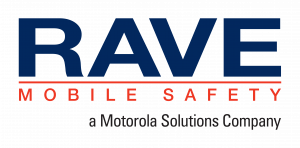
Smart911 Notification System
In our efforts to provide more reliable communications with Residents and Businesses in the Garden City Park Water District, we have implemented Rave Mobile Safety as our Emergency Notification service provider.
Rave Mobile Safety in its simplest form is a system that makes phone calls to specific people or areas in the event of an emergency or for sharing important information.
If you are not receiving these calls, please fill out the form below to add or update your contact information. You may also remove yourself from our lists.
The Garden City Park Water District has implemented a hydrant flushing program and plans to flush hydrants throughout the district over the next few weeks during the hours of 10pm and 12am.
Under this flushing program, fire hydrants are opened in order to remove sediment that may have collected within our water mains to ensure that we provide the residents of our district with the highest quality water. This program also allows us to test that our fire hydrants function properly and provide sufficient fire protection.
Hydrant flushing in your area may be responsible for temporary lower water pressure, discolored water and/or water collecting in the street where maintenance is being performed. Rusty or discolored water is a normal result of the flushing process and is not harmful to your health. If you experience discolored water it should only last for the day on which work is conducted. We recommend running the cold water from a faucet at the closest point to where your water service enters your home, discolored/rusty water typically clears within an hour.
Please click here to view the 2022 Annual Water Quality Report
Construction at Plant 8 has been progressing nicely. The newly installed AOP (Advanced Oxidation Process) and GAC (Granular Activated Carbon) Vessels are the newest cutting edge technology used to remove 1,4 Dioxane and PFOA/S. We anticipate Plant 8 being operational for the 2023 pumping season!
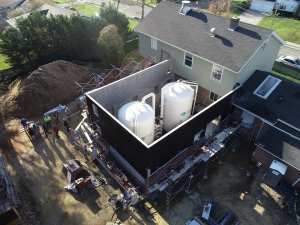

(11/23/2022) (2/9/2023)
To see the annual financial report please click the following link:
The Garden City Park Water District (GCPWD) is the vanguard of our community’s water utility, and as our community grows, safeguarding our water supply requires a tremendous amount of vigilance and foresight. In 2020, our District and the Town of North Hempstead came to a resolution on a $30 million bond to accommodate the enhancements necessary to achieve our mission as identified in the GCPWD capital improvement plan. “Our capital improvement program is complex, multifaceted and heavily focused on addressing emerging contaminants. We have worked tirelessly with our team of engineers, superintendent, and support vendors to carefully manage and implement a phased approach ensuring the best service with the least amount of burden on our community,” remarked Water Commissioner Peter Chimenti. “It includes new water treatment technology, repairs and upgrades to aging facilities, as well as rehabilitating and refurbishing wells and tanks.”
Ahead of the Curve: New Water Treatment Technology
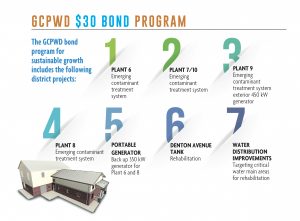
New water treatment technology for emerging contaminants is a large part of the program and will accommodate the New York State and Department of Health mandate, which recently granted a 2-year deferral to water suppliers with treatment process plans in place. GCPWD is pleased to inform our consumers we are ahead of the game and construction is already underway supplementing the processes we currently have in place. We qualified for the deferral, yet never had to rely on it. “We’re proud to say we’ve constructed some of the most advanced water treatment systems in the country, with the ability to carry our vision into the future,” noted Water Commissioner Kenneth Borchers.
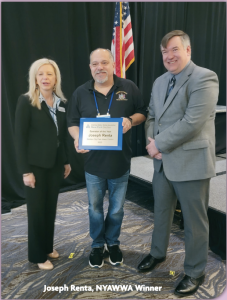
Joseph Renta, Supervisor of Water Plant Operations GCPWD;
Brian Sibiga, PE, NYSAWWA Chair.
Joseph Renta, Supervisor of Water Plant Operations, Garden City Park Water District, took home the prestigious AWWA Operator’s Meritorious Service Award at the American Water Work Association’s Annual Conference – New York Section in Saratoga Springs this past April. The award is presented to only one operator, recognized at the section level for:
• Continuous compliance with all public health standards in treated drinking water
• Consistent outstanding contribution to plant maintenance
• Special efforts in the training of plant operators
• Demonstration of dedication to the public beyond operating responsibilities
Joseph began his career with GCPWD in 1988 as a water servicer, becoming plant operator in 2008 and moving his way up the ranks to supervisor by 2016.
Congratulations, Joe!
Dennis Peitler of Mineola High School is the recipient of the Nassau Suffolk Water Commissioners’ Association ‘Nicholas J. Bartilucci Manhattan College Scholarship Award’. The award is presented to a student for their scholastic achievement and desire to enter any engineering program as a full-time course of study at Manhattan College.
“Garden City Park is proud of Dennis’ accomplishments and all of our future engineers,” remarked Water Commissioner Peter Chimenti, who presented the award to Dennis alongside Water Commissioner Kenneth Borchers.
The annual scholarship is open to entering freshmen enrolled full-time in any engineering degree program at Manhattan College with emphasis placed on academic credentials.
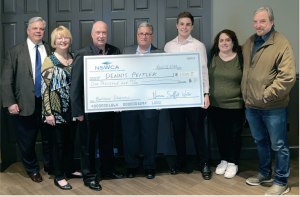
District Chairperson and NSWCA President; Kenneth Borchers and Peter Chimenti, Garden City Park Water District
Commissioners; and Dennis Peitler along side his parents Maria and John Peitler.

Alan Cooper, Ph.D.
This past December, Alan Cooper, Ph.D. was elected Garden City Park Water/Fire Commissioner. Dr. Cooper is currently the Associate Dean of the Willumstad School of Business at Adelphi University, and owner of the Tudor Advisory Group, a management consulting firm. He also serves on the North Hempstead Housing Authority. Dr. Cooper brings a wealth of experience in working with municipal organizations and institutions. “With all the changes and challenges facing our community, I am excited to bring my experience, education and background to the task,” said Dr. Cooper. Dr. Cooper also brings familiarity to the position, having served as commissioner with the Garden City Park Water/ Fire District in prior years. Welcome back, Alan!
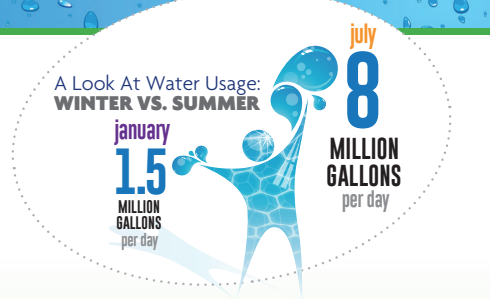 Over the past few years we’ve met the New York State Department of Environmental Conservation’s goal of reducing water usage by 15 percent during the peak months of May through September. We implemented a conservation plan and your continuous efforts helped achieve our collective objectives.
Over the past few years we’ve met the New York State Department of Environmental Conservation’s goal of reducing water usage by 15 percent during the peak months of May through September. We implemented a conservation plan and your continuous efforts helped achieve our collective objectives.
As you can see by the above graphic, GCPWD pumps nearly 5 times the amount of water during a typical summer day than a typical day during winter. Below are helpful reminders and conservation tips for your home and business to help us reduce water usage this season!
Lawn, Landscape and Garden Irrigation
Watering is PROHIBITED between 6 a.m. and 6 p.m. Remember to follow Nassau County’s irrigation ordinance:
- Odd-numbered homes may water on odd-numbered days.
- Even-numbered homes may water on even-numbered days.
- Premises without numbered addresses may water on even-numbered days.
Outdoor Water Usage
- Check all outside hoses and connections for leaks and possible winter damage.
- Stop wasting water. Install a springloaded shutoff nozzle on each garden hose.
- Keep your lawn length approximately 2 inches. This reduces evaporation and will require less watering.
- Leave grass clippings on your lawn. This boosts water retention and will help your lawn grow thicker.
Indoor Water Usage
- Check appliances for leaks. Common leaks waste 10% of the water used in many homes.
- Replace old toilets. Toilet flushing is the top water user in the home.
- Run your dishwashers and washing machines only when they are fully loaded.
- Turn off your faucet when brushing your teeth, washing your hands and dishes. Why waste water?
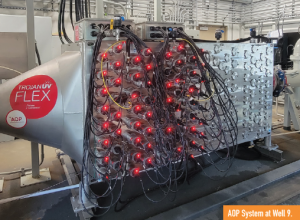 The New York State Department of Health (NYS DOH) recently adopted a drinking water regulation that requires all public water systems to provide treatment for PFOA, PFOS and 1,4-dioxane. Taking a proactive stance, Garden City Park Water District (GCPWD) began taking steps to evaluate advanced water treatment technologies to address emerging contaminants beginning in mid-2018, well before the new standards were put in place.
The New York State Department of Health (NYS DOH) recently adopted a drinking water regulation that requires all public water systems to provide treatment for PFOA, PFOS and 1,4-dioxane. Taking a proactive stance, Garden City Park Water District (GCPWD) began taking steps to evaluate advanced water treatment technologies to address emerging contaminants beginning in mid-2018, well before the new standards were put in place.
Advanced Oxidation Process (AOP) is the most technologically advanced treatment process and a proven solution that removes the compounds from drinking water. Construction of AOP reactors at Well 9 began in fall 2019, and at Well 6 in February 2020. Completion has made the wells compliant with New York State’s 1,4-dioxane regulations of a maximum contaminant level (MCL) of 1 part per billion; and for PFOA and PFOS at 10 parts per trillion.
All well sites throughout the District have Granular Activated Carbon (GAC), which removes certain chemicals, mostly organic, from water. Just 10 grams of granulated activated carbon (less than a third of an ounce), has a surface area equal to a standard NFL football field. That porosity is why GAC is ideal for eliminating emerging contaminants in water and that’s also why GCPWD has implemented this technology throughout the District.
“We have some of the most sophisticated water technology in the region,” said Commissioner Kenneth Borchers. “We brought our facilities up to the latest standards with the most advanced, state-of-the-art technology. By staying ahead of the curve, we were well prepared to meet the new standards before they were ever released.”
Please view and download our Update on Wellhead Treatment Progress, February 3, 2021 pdf.
The Garden City Park Water District currently meets all requirements and is no longer in need of a deferral.
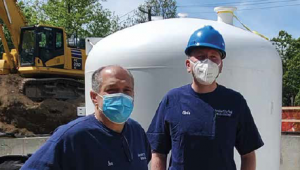
The impact of COVID-19 has created a seismic impact on each of our lives. While it is impossible to predict what the world will look like as we continue to fight through this pandemic, we at the Garden City Park Water District continue to provide the essential service of delivering an uninterrupted water supply to our customers throughout the District, and our water continues to be in compliance with all federal, New York State and Nassau County regulations.
“While our offices remain closed to the general public to protect the health and safety of our staff and customers, we continue to work and adhere to the conditions and mandates of the state of emergency,” stated Water Commissioner Peter Chimenti. The District has taken numerous precautionary measures to protect the health of all personnel, including the enforcement of social distancing and the use of masks and gloves. Chimenti added, “Our offices are cleaned and disinfected daily, as well the District fleet of vehicles.”
It’s important to inform you that our water supply remains unaffected by the COVID-19 coronavirus outbreak. The Centers for Disease Control (CDC) and the World Health Organization have confirmed that the COVID-19 virus is not waterborne and that the standard disinfection done by water suppliers as regular practices are an effective method for inactivating the COVID-19 virus.
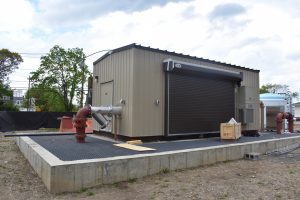 When potable drinking water is involved, facing potential situations before they happen is the smartest and most prudent course. That’s why your Garden City Park Water District is addressing concerns about emerging contaminants now by taking proactive measures.
When potable drinking water is involved, facing potential situations before they happen is the smartest and most prudent course. That’s why your Garden City Park Water District is addressing concerns about emerging contaminants now by taking proactive measures.
“We’re proceeding with Advanced Oxidation Process (AOP) reactors in Wells 6 and 9,” Water Commissioner Chris Engel stated. “Preventive treatment puts us ahead of the curve. Things may look a bit messy during construction, yet this is our tax payer dollars at work. Pilot studies indicated introducing Advance Oxidation is the best avenue to assuring present and future water quality.”
Construction of the AOP reactors at Well 9 began in fall 2019, and Well 6 began in February 2020. Construction is slated to continue throughout this summer.
What is AOP?
Technically speaking, oxidation is a reaction that involves the moving of electrons in a substance. Advanced Oxidation Process (AOP) is a highly regarded solution that removes organic and inorganic materials from drinking water. The primary treatment mechanism involves the reaction of UV light with a strong oxidizing agent like hydrogen peroxide or chlorine to generate highly reactive hydroxyl radicals. The final processing goes through a Granular Activated Carbon filter to remove the contaminants from the water.
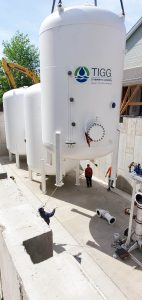 The flurry of activity at our Shelter Rock Road plants since March will end in June when the installation of Granular Activated Carbon (GAC) filtration systems are completed.
The flurry of activity at our Shelter Rock Road plants since March will end in June when the installation of Granular Activated Carbon (GAC) filtration systems are completed.
Water Commissioner Kenneth Borchers explained, “A total of four GAC filters were recently installed, two each at Plant 7 and at Plant 10. This technology will treat emerging contaminants in our water by the process of adsorption. Construction is being done simultaneously since the plants are adjacent to one another. This will expedite installation, minimize potential interruptions and we can take advantage of economies of scale. It’s a win-win situation.”
How Does GAC Work?
Granular Activated Carbon (GAC), which can be derived from wood, peat, coal, lignite or even coconut shells, is a remarkable substance with a unique pore structure consisting or micro-pores, meso-pores and macro-pores. Unlike the process of absorption where atoms, molecules or ions actually permeate a liquid or solid, in adsorption the atoms, molecules or ions form a film and adhere to the surface of the liquid or solid without penetrating. To put it into persepective, 10 grams of granulated activated carbon, (less than a third of an ounce), has a surface area equal to a standard NFL football field. That porosity is why GAC is ideal for eliminating emerging contaminants in water.
Garden City Park Water District has approximately 1,550 isolation valves within the distribution service area ranging from 4 to 16 inches. Valves are used to isolate water main breaks and facilitate the water department’s quick response to any distribution system emergencies that occur. We are continuously conducting a comprehensive valve maintenance program of inspecting, exercising and replacement of valves. This program will help us avoid potentially serious problems when the need to use a valve arises.
Increased Revenue Will Fund Various Infrastructure Upgrades to Improve Water Quality and Distribution System Resiliency
The Garden City Park Water District would like to notify its customers that a rate adjustment will be implemented beginning the 4th billing quarter of 2019. The additional revenue will help the District pay for past, current and future infrastructure projects needed to ensure the health and safety of the water supply. The rate adjustment also means the District will remain within the two percent tax cap.
The District works continuously to provide residents of our community with the highest quality water at the lowest possible cost. The costs of running a water district continue to climb as we are met with increased operational challenges and more stringent testing parameters. We are always working to maximize efficiencies, identifying areas for cost savings while maintaining our unwavering commitment to the health and safety of our water supply and distribution system.
A thorough review of the present water rate structure and property taxes with respect to the fiscal needs of the District was conducted to determine the amount of revenue needed to make ends meet. In order to remain within the two percent tax cap and maintain a high level of service and reliability in regards to the critical drinking water infrastructure, an increase to water rates was necessary. Below, you will find a three year step program:
Year 1
Residential: 2019
- Minimum quarterly bill (up to 10 thousand gallons): New rate $14
- $1.90 per thousand gallons after initial 10 thousand gallons
Commercial: 2019
- Minimum quarterly bill (up to 20 thousand gallons): New rate $50
- $2.50 per thousand gallons after initial 20 thousand gallons
Year 2
Residential: 2020
- Minimum quarterly bill (up to 10 thousand gallons): New rate $16
- $2.20 per thousand gallons after initial 10 thousand gallons
Commercial: 2020
- Minimum quarterly bill (up to 20 thousand gallons): New rate $55
- $2.75 per thousand gallons after initial 20 thousand gallons
Year 3
Residential: 2021
- Minimum quarterly bill (up to 10 thousand gallons): New rate $18
- $2.50 per thousand gallons after initial 10 thousand gallons
Commercial: 2021
- Minimum quarterly bill (up to 10 thousand gallons): New rate $60
- $3.00 per thousand gallons after initial 20 thousand gallons
The new rate structure will take effect on the 4th quarter bill received by all customers. The following schedule shows when your increase will take effect:
- Accounts beginning with 01, 02, 03 and 04 will see increase on October, 2019 bill
- Accounts beginning with 05, 06, 07 and 08 will see increase on November, 2019 bill
- Accounts beginning with 09, 10, 11 and 12 will see increase on December, 2019 bill
We are always striving to cut costs where appropriate and maximize economies of scale, but the rising costs for infrastructure and operations are simply outpacing our ability to reduce spending. Maintaining old and building new infrastructure on top of the costs of each year is not cheap. However, we are thankful our residents understand these increasing challenges and continue to support our effort to supply the Garden City Park Water District community with a safe and reliable water system.
Sincerely,
Garden City Park Water/Fire District
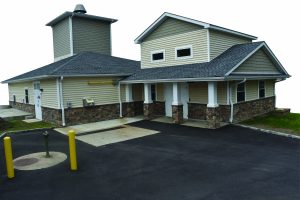 Believe it or not, Garden City Park Water District (GCPWD) has been serving the local community of Garden City Park for close to 100 years! Time doesn’t stand still, and in an effort to keep pace with technology and infrastructure advancements, the District is committed to meeting the existing and anticipated demands of delivering water to our consumers.
Believe it or not, Garden City Park Water District (GCPWD) has been serving the local community of Garden City Park for close to 100 years! Time doesn’t stand still, and in an effort to keep pace with technology and infrastructure advancements, the District is committed to meeting the existing and anticipated demands of delivering water to our consumers.
A few years ago, the District embarked on a capital campaign to fund new projects – including the rebuild of Plant No. 9 located at County Court House Road. Today Plant No. 9 is in full operation and pumping water within the District.
Built in 1969, Plant No. 9 was in dire need of rehabilitation and a rebuild. This included modernization and automation. Designed as a two-phase project, the work included:
- Pump and motor replacement
- Upgrade of the motor control center
- Raise base to meet current Nassau County Department of Health standards
- Upgrade existing booster pump
- Replace air-stripping tower
- Complete rebuild and upgrade of Nitrate removal system
“We’re happy to announce that Plant No. 9 is fully operational and in service delivering potable water to our consumers,” said Water Commissioner Chris Engel. “A lot of engineering went into this project, and Plant No. 9 is now state-of-the-art in regard to equipment, pumping motors and technology. The plant is operating with peak efficiency, and we thank our staff for a job well done.”
It all starts with the facts of water production on Long Island. The water that you use day in and day out for every purpose originates far below our surface and is drawn from the Magothy Aquifer.
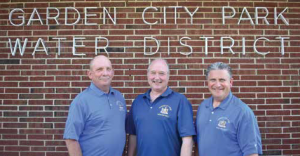
Commissioners Chris Engel, Kenneth
Borchers and Peter Chimenti.
The Water Commissioners that you elect to manage the District are your neighbors, and they live right here in the community they serve. It’s the responsibility of the Commissioners to be fiscally sound and protect local taxpayers. Annual voting for Water Commissioners ensure that your investment is in safe hands with local control.
Your water rate is less than two percent of your Nassau County residential taxes. The monies collected by Garden City Park Water District are used for water production, operations and maintenance by this District and this District alone. Funds are not redirected for some other non-water-related project. What comes in, stays in!
The reality is that through local control, each community has responsibly financed and regulated its own water supply for many years. The fact is, progress and improvement have come promptly and appropriately without the bureaucratic disadvantages associated with massive political governing bodies. Garden City Park Water District operates 24/7/365 with a staff of 12 serving 18,000 people.
To that end, GCPWD Water Commissioners provide an indispensable service of delivering high quality, potable water to households and businesses within the District. It takes dedication and hard work, and we will continue to do everything possible to guarantee the highest quality water at the lowest possible cost.
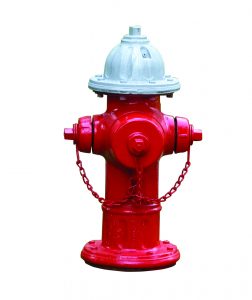 It’s important for residents to know that Garden City Park Water and Fire District services all 700 hydrants within our District. Keeping them up to code is a task that we take seriously, especially when our firefighters need them to perform at optimal efficiency.
It’s important for residents to know that Garden City Park Water and Fire District services all 700 hydrants within our District. Keeping them up to code is a task that we take seriously, especially when our firefighters need them to perform at optimal efficiency.
Our Yearly Hydrant Program Includes:
- Painting hydrants to protect their metal fabrication and allow firefighters to readily locate them
- Greasing and/or oiling all necessary parts
- Hydrants are flushed and flow is confirmed
- Testing drain function to make sure hydrants drain properly
- Recording line pressure for each hydrant
- Checking to ensure the hydrant isolation valve is functioning properly
- Additional standard maintenance as suggested by the hydrant manufacturer
Residents can assist with this ongoing project by making sure their landscape improvements do not block access to or interfere with the operation of fire hydrants. Landscaping should not block the three caps on the side of the hydrant, which in an emergency are removed to connect fire hoses. Also, the top of the hydrant should be free of landscaping so the hydrant can be turned on without interference.
In winter, we also remind all residents who have fire hydrants in front of their homes to kindly remove all snow around the hydrant to allow access during an emergency.
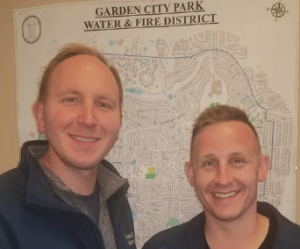 We’re proud to announce that David Dziomba and Christopher Tobin won the Long Island Region Top Operators competition and recently competed at the American Water Works Association (AWWA) spring program in Saratoga Springs, NY. David and Chris qualified as one of only three teams statewide. Congratulations Dave and Chris – You Earned It!
We’re proud to announce that David Dziomba and Christopher Tobin won the Long Island Region Top Operators competition and recently competed at the American Water Works Association (AWWA) spring program in Saratoga Springs, NY. David and Chris qualified as one of only three teams statewide. Congratulations Dave and Chris – You Earned It!
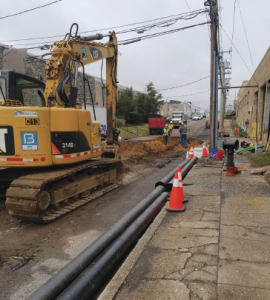 As part of the Capital Improvement Program, the District began replacing the oldest sections of its 76 miles of main in October 2016. Since then, 6,000 feet has been added in the southeast portion of the District – Garden City Park – just south of Jericho Turnpike.
As part of the Capital Improvement Program, the District began replacing the oldest sections of its 76 miles of main in October 2016. Since then, 6,000 feet has been added in the southeast portion of the District – Garden City Park – just south of Jericho Turnpike.
The 6-inch pipe has been replaced with 8-, 10- or 12-inch pipe and new hydrants will be installed to help provide better flow, volume and capacity. The improvements will also increase the life expectancy of the system andhelp local fire departments meet water pressure demands.
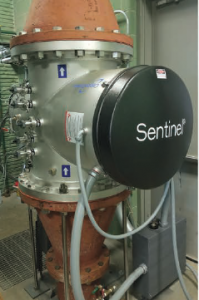 Although the Environmental Protection Agency (EPA) has not yet set a standard for 1,4-dioxane, GCPWD is not waiting for a resolution. In fact, the District, with oversight from Nassau County Department of Health, has installed a treatment system at Plant No. 8 (which is off-line) to remove 1,4-dioxane through a chemical reaction and UV light. After treatment with chlorine and UV, levels are so low they can barely be detected.
Although the Environmental Protection Agency (EPA) has not yet set a standard for 1,4-dioxane, GCPWD is not waiting for a resolution. In fact, the District, with oversight from Nassau County Department of Health, has installed a treatment system at Plant No. 8 (which is off-line) to remove 1,4-dioxane through a chemical reaction and UV light. After treatment with chlorine and UV, levels are so low they can barely be detected.
It’s important for consumers to know that 1,4-dioxane is used in everyday household products such as cosmetics, detergents, shampoos, deodorants, sunscreens and more. “We’re concerned about it and we’re taking action to treat our water,” commented the Board of Commissioners. “And while our levels are quite low compared to other parts of Long Island, we’re moving forward to create a solution.”
This pilot program is part of the 2016 Bond Project and if proven successful, the treatment program will be implemented across the District.
